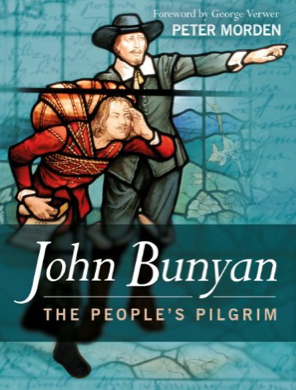John Bunyan - The People’s Pilgrim
John Bunyan - The People’s Pilgrim
By Peter Morden
CWR
ISBN: 9781853458361
Reviewed by Bob Holman
Peter Morden has written a lively and gripping account of the life of John Bunyan. Above all, he shows that Bunyan’s activities and teachings are as relevant today as they were in the 17th century.

Bunyan certainly was not born into prominence. Even his date of birth is uncertain - probably 1628. His illiterate father was a tinker in the village of Elstow. His mother and oldest sister died in his teens and Bunyan enlisted as a soldier on the side of the Parliamentarians against the Royalists. The former were victorious, although there is no record of Bunyan fighting. It was probably at this time that he accepted the religious views of the Dissenters, those who worshipped outside of the Church of England.
By the early 1650s, he was married and attending a small church in Bedford. It was here that he found Christ as Lord and Saviour and, despite his lack of learning, was soon a preacher. His wife’s name is not known, just that she died in in 1658. By this time the deposed monarchy was back and inflicting persecution on those who would not attend the Church of England. Despite the threats, Bunyan - much strengthened by his second wife, Elizabeth - refused to comply. In 1660, he was thrown into Bedford prison.
With no heat, no bed, meagre food, no prospect of release, it was a miserable existence. Morden does not hide the fact that Bunyan was liable to depression and writes, “It is little surprise that in such circumstances his depression returned” (p97). But he persevered in prayer, bible reading and worship and was revived. Morden points out that Christians today are also vulnerable to depression and require the support of other Christians.
Oddly enough, prison also proved a blessing. He had time to write.
Grace Abounding and
The Holy City were amongst those published. He also wrote much of his most famous book,
The Pilgrim’s Progress, although not published until after his release. It has appeared in over 200 different languages and, after the bible, is probably the world’s most printed book.
Released from prison in 1672, Bunyan had already been called as pastor to the Bedford church. His reputation as an author and his powerful preaching led to invitations to speak all over the country. In 1688, he rode on horseback through heavy rain to a preaching engagement in London. He caught influenza or pneumonia and Morden records, “His vigorous constitution had been weakened by many years of travelling in all weathers, not to mention the ravages of his time in prison. Nearly 60 years of age, he was unable to throw off the illness” (p177). He died in 1688.
Professor Christopher Hill, a Marxist who writes about Bunyan’s readiness to break certain laws, has to admit that “his first priority was to be able to worship and to preach according to what he believed to be God’s will” (
A Tinker and a Poor Man, Norton, 1988, p15). In addition, as Morden makes clear, Bunyan never pursued wealth, spend his time with ordinary people and preached the gospel to the poor and needy. The church needs people like him today.
Bob Holman is a member of Easterhouse Baptist Church